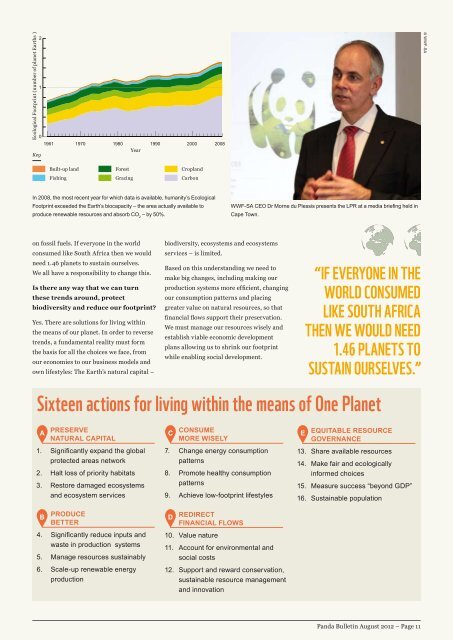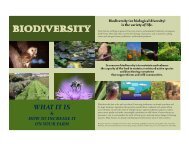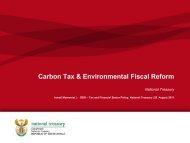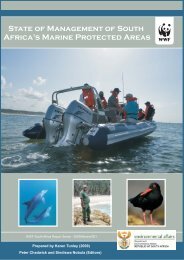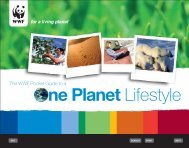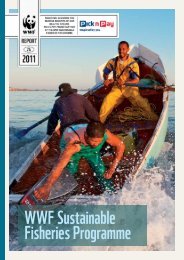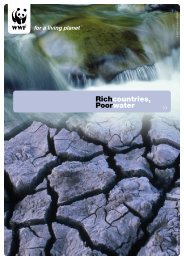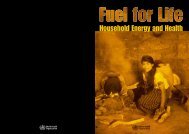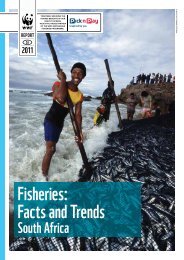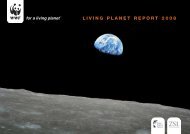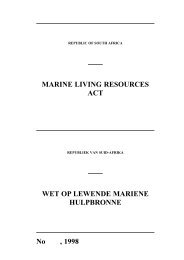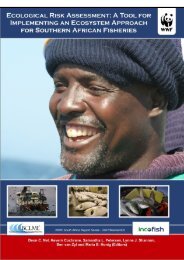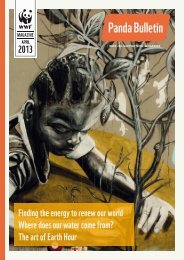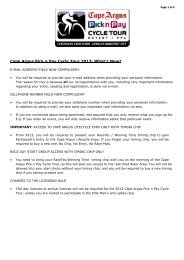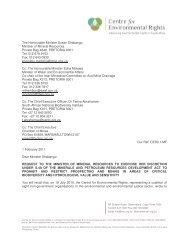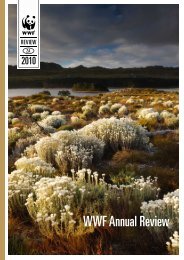Living Planet Report - WWF South Africa
Living Planet Report - WWF South Africa
Living Planet Report - WWF South Africa
Create successful ePaper yourself
Turn your PDF publications into a flip-book with our unique Google optimized e-Paper software.
Ecological Footprint (number of planet Earths )<br />
2<br />
1<br />
0<br />
Key<br />
on fossil fuels. If everyone in the world<br />
consumed like <strong>South</strong> <strong>Africa</strong> then we would<br />
need 1.46 planets to sustain ourselves.<br />
We all have a responsibility to change this.<br />
Is there any way that we can turn<br />
these trends around, protect<br />
biodiversity and reduce our footprint?<br />
Yes. There are solutions for living within<br />
the means of our planet. In order to reverse<br />
trends, a fundamental reality must form<br />
the basis for all the choices we face, from<br />
our economies to our business models and<br />
own lifestyles: The Earth’s natural capital –<br />
Sixteen actions for living within the means of One <strong>Planet</strong><br />
A<br />
preSerVe<br />
nAturAl cApitAl<br />
1. Significantly expand the global<br />
protected areas network<br />
2. Halt loss of priority habitats<br />
3. restore damaged ecosystems<br />
and ecosystem services<br />
b<br />
1961 1970 1980 1990 2000 2008<br />
Year<br />
Built-up land<br />
Fishing<br />
proDuce<br />
better<br />
Forest<br />
Grazing<br />
4. Significantly reduce inputs and<br />
waste in production systems<br />
5. Manage resources sustainably<br />
6. Scale-up renewable energy<br />
production<br />
biodiversity, ecosystems and ecosystems<br />
services – is limited.<br />
Based on this understanding we need to<br />
make big changes, including making our<br />
production systems more efficient, changing<br />
our consumption patterns and placing<br />
greater value on natural resources, so that<br />
financial flows support their preservation.<br />
We must manage our resources wisely and<br />
establish viable economic development<br />
plans allowing us to shrink our footprint<br />
while enabling social development.<br />
c<br />
D<br />
Cropland<br />
Carbon<br />
in 2008, the most recent year for which data is available, humanity’s ecological<br />
Footprint exceeded the earth’s biocapacity – the area actually available to<br />
produce renewable resources and absorb Co – by 50%.<br />
2<br />
conSuMe<br />
More WiSely<br />
7. Change energy consumption<br />
patterns<br />
8. Promote healthy consumption<br />
patterns<br />
9. Achieve low-footprint lifestyles<br />
reDirect<br />
FinAnciAl FloWS<br />
10. Value nature<br />
11. Account for environmental and<br />
social costs<br />
12. Support and reward conservation,<br />
sustainable resource management<br />
and innovation<br />
<strong>WWF</strong>-SA CEO Dr Morne du Plessis presents the LPR at a media briefing held in<br />
Cape Town.<br />
e<br />
“IF EvERYONE IN ThE<br />
WORLD CONSUMED<br />
LIkE SOUTh AFRICA<br />
ThEN WE WOULD NEED<br />
1.46 PLANETS TO<br />
SUSTAIN OURSELvES.”<br />
eQuitAble reSource<br />
goVernAnce<br />
13. Share available resources<br />
14. Make fair and ecologically<br />
informed choices<br />
15. Measure success “beyond GDP”<br />
16. Sustainable population<br />
Panda Bulletin August 2012 – Page 11<br />
© <strong>WWF</strong>-SA


